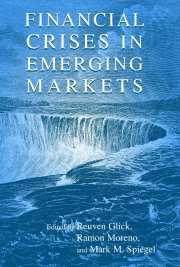Book contents
- Frontmatter
- Contents
- Preface
- Contributors
- 1 Financial Crises in Emerging Markets: An Introductory Overview
- PART I DETERMINANTS AND PROPAGATION OF FINANCIAL CRISES
- PART II CAPITAL FLOWS AND REVERSALS
- 5 Uncertainty and the Disappearance of International Credit
- Discussion
- 6 International Capital Inflows, Domestic Financial Intermediation, and Financial Crises under Imperfect Information
- Discussion
- 7 Private Inflows when Crises Are Anticipated: A Case Study of Korea
- Discussion
- PART III INSTITUTIONAL FACTORS AND FINANCIAL STRUCTURE
- PART IV POLICY RESPONSES
- Index
Discussion
Published online by Cambridge University Press: 04 August 2010
- Frontmatter
- Contents
- Preface
- Contributors
- 1 Financial Crises in Emerging Markets: An Introductory Overview
- PART I DETERMINANTS AND PROPAGATION OF FINANCIAL CRISES
- PART II CAPITAL FLOWS AND REVERSALS
- 5 Uncertainty and the Disappearance of International Credit
- Discussion
- 6 International Capital Inflows, Domestic Financial Intermediation, and Financial Crises under Imperfect Information
- Discussion
- 7 Private Inflows when Crises Are Anticipated: A Case Study of Korea
- Discussion
- PART III INSTITUTIONAL FACTORS AND FINANCIAL STRUCTURE
- PART IV POLICY RESPONSES
- Index
Summary
This chapter makes a compelling case that the Korean financial crisis of 1997 was not the consequence of a misaligned exchange rate and external imbalance, nor was it the classic first-generation credit-financed fiscal deficit stressed by Krugman (1979). The authors also cast doubt on explanations of the Korean crisis that rely exclusively on a liquidity-crisis/banking panic story, as in Goldfajn and Valdés (1995), or on earlier models with self-fulfilling expectations (see, for instance, Obstfeld, 1994). Instead, they argue that the Korean banking and currency crises had their origins in the financial liberalization that took place in the earlier part of the 1990s. Financial liberalization, coupled with explicit or implicit government guarantees, fueled a surge in capital inflows that were largely intermediated through Korean banks. Owing to (in part) increased competition, the banks saw their franchise value erode, took on greater risk, and relied increasingly on foreign creditors. A central theme of the chapter, as the title suggests, is that the financial liberalization/Dooley (2000) insurance explanations of the crisis offer testable predictions as to what the antecedents of the crisis should be – particularly as to the nature of capital flows and bank lending – and that these predictions accord well with the Korean stylized facts.
I will divide my remarks into three parts. First, I will elaborate on some of the points made in the chapter, as to why financial liberalization and moral hazard have played a very important role in explaining the antecedents of the twin crises – in Korea and elsewhere. I will also refer to a variety of “stylized facts” that, over and beyond the Korean episode, fit well with the insurance/capital inflow story.
- Type
- Chapter
- Information
- Financial Crises in Emerging Markets , pp. 275 - 280Publisher: Cambridge University PressPrint publication year: 2001



